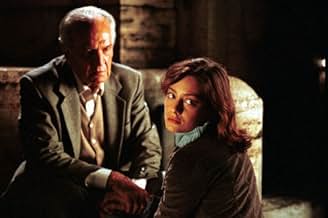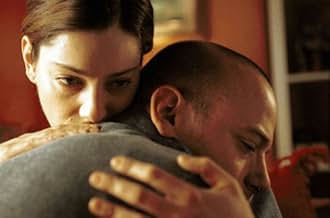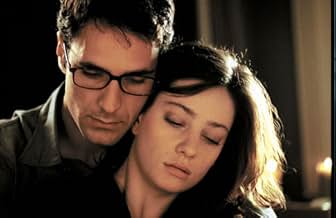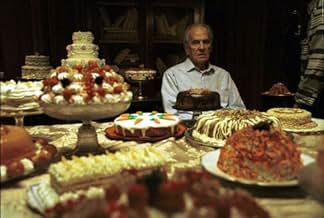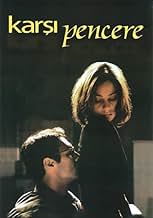VALUTAZIONE IMDb
7,2/10
12.018
LA TUA VALUTAZIONE

Riproduci clip2: 59
Guarda Facing Windows Scene: I Don't Taste Things As Good As I Once Did
Sovraccaricata e bloccata in un matrimonio ingrigito, Giovanna si prende cura dell'ebreo sopravvissuto all'Olocausto che suo marito porta a casa. Mentre inizia a riflettere sulla sua vita, s... Leggi tuttoSovraccaricata e bloccata in un matrimonio ingrigito, Giovanna si prende cura dell'ebreo sopravvissuto all'Olocausto che suo marito porta a casa. Mentre inizia a riflettere sulla sua vita, si rivolge all'uomo che vive di fronte a lei.Sovraccaricata e bloccata in un matrimonio ingrigito, Giovanna si prende cura dell'ebreo sopravvissuto all'Olocausto che suo marito porta a casa. Mentre inizia a riflettere sulla sua vita, si rivolge all'uomo che vive di fronte a lei.
- Regia
- Sceneggiatura
- Star
- Premi
- 34 vittorie e 24 candidature totali
Antonella Antinori
- Tintora
- (as Veronica Bruni)
Ohame-Brancy Chibuzo
- Alessio
- (as Ohame Brancy Chibuzo)
Recensioni in evidenza
I very much appreciated Ozpetek's previous film, "Le fate ignoranti", which has earned him a lot of respect on the part of both audiences and critics, in Italy and beyond. I was reluctant to go see this film because of the casting of Raoul Bova (a second-rate actor who doesn't have much substance behind his good looks and began his career as a teenage heartthrob - what a pity it didn't end there) and because of the reference to the Nazi deportation of Roman Jews, which took place on October 16th, 1943 - I just felt that to use this as a pretext for a gay love story was kind of cheap. But nearly everyone I knew who had gone see the film kept me telling that it was good, so I became so curious that I decided to go. Well, my friends were absolutely right.
Ozpetek's strength is his ability to portray characters that are realistic without being obvious, so everyone can relate to them without identifying with them. He showed that already good ability in "Le fate ignoranti" as well, but this time he seems to have developed it even further. His approach is always personal, and this enables him to make films that are deeply introspective. It is the kind of films that the French are usually good at making, but Ozpetek in not an imitator. What makes his films so DIFFERENT is that there seems an emotional involvement that is very difficult to find elsewhere; at the same time, this never translates into trite sentimentalism or dull rhetoric.
This is an outstanding film, and this is so also thanks to the performances given by most of the actors. Massimo Girotti, in his last appearance before his death, shows that, at about 80 years of age, he was still able to be a first-class actor (and this explains why he featured in so many films by Visconti); after this film, which is dedicated to him, we will all miss him even more than we already did. Giovanna Mezzogiorno, the daughter of a late actor herself, also gives an outstanding performance as the woman who finds herself at the crossroads and is torn between passion and the responsibilities of everyday life, between reality and desire, just like so many of us often are. Filippo Nigro, who also featured in a minor role in "Le fate ignoranti", is given a more important role in this film, and deservedly so. The only exception is Raoul Bova, and I wonder why Ozpetek seems to have a compelling need to cast "actors" who are more sort of toy boys, mostly in secondary roles (Bova in this case, Gabriel Garko in "Le fate ignoranti"), who usually have very limited acting abilities and who almost inevitably end up faring very poorly and suffering from the comparison that is inevitably drawn between their performances and those of the other actors who feature in the films; which is even more striking if we take into account the fact that Ozpetek seems to have the ability to rejuvenate actors and to make them play characters that are very different from their clichés (as an example, consider not only Massimo Girotti in this case, but also Margherita Buy in "le fate ignoranti").
Just one word for the soundtrack, which made the film even more touching and has spawned a major Italian chart hit.
The only criticism that can be made? How come that Italian directors seem to have lost the ability to say something about the society in which they live? In the past, they were able to be sardonic about it, and to intertwine the two levels, social and personal. Now the only films they seem able to make are personal-only stories, and that's a pity.
Altogether, a deeply recommended film.
Ozpetek's strength is his ability to portray characters that are realistic without being obvious, so everyone can relate to them without identifying with them. He showed that already good ability in "Le fate ignoranti" as well, but this time he seems to have developed it even further. His approach is always personal, and this enables him to make films that are deeply introspective. It is the kind of films that the French are usually good at making, but Ozpetek in not an imitator. What makes his films so DIFFERENT is that there seems an emotional involvement that is very difficult to find elsewhere; at the same time, this never translates into trite sentimentalism or dull rhetoric.
This is an outstanding film, and this is so also thanks to the performances given by most of the actors. Massimo Girotti, in his last appearance before his death, shows that, at about 80 years of age, he was still able to be a first-class actor (and this explains why he featured in so many films by Visconti); after this film, which is dedicated to him, we will all miss him even more than we already did. Giovanna Mezzogiorno, the daughter of a late actor herself, also gives an outstanding performance as the woman who finds herself at the crossroads and is torn between passion and the responsibilities of everyday life, between reality and desire, just like so many of us often are. Filippo Nigro, who also featured in a minor role in "Le fate ignoranti", is given a more important role in this film, and deservedly so. The only exception is Raoul Bova, and I wonder why Ozpetek seems to have a compelling need to cast "actors" who are more sort of toy boys, mostly in secondary roles (Bova in this case, Gabriel Garko in "Le fate ignoranti"), who usually have very limited acting abilities and who almost inevitably end up faring very poorly and suffering from the comparison that is inevitably drawn between their performances and those of the other actors who feature in the films; which is even more striking if we take into account the fact that Ozpetek seems to have the ability to rejuvenate actors and to make them play characters that are very different from their clichés (as an example, consider not only Massimo Girotti in this case, but also Margherita Buy in "le fate ignoranti").
Just one word for the soundtrack, which made the film even more touching and has spawned a major Italian chart hit.
The only criticism that can be made? How come that Italian directors seem to have lost the ability to say something about the society in which they live? In the past, they were able to be sardonic about it, and to intertwine the two levels, social and personal. Now the only films they seem able to make are personal-only stories, and that's a pity.
Altogether, a deeply recommended film.
Sadly, this type of film is all too rare.
Without the relying on clichéd plot-devices, it achieves a striking level of dramatic intensity through character and relationship development. You care what happens to them as if you knew them personally and thats why it works.
As soon as the credits began to roll, I immediately wanted to watch the film all over again. It left me with so many questions and thoughts, about my own life- a cinematic version of Coelho's Alchemist?
For me, the recurring theme in the film, is choices- life choices- forks in the road- and the consequences our decisions yield.
1. Davide stalling on the cobbled stoned streets- torn between his lover and his town. 2. Giovanna and Filippo on the bridge, arguing whether they should get involved with the strange old man. 3. Giovanna and the two men in her life. 4. Giovanna at window in Lorenzos house having a crisis of conscience. 5. Lorenzo taking up the work opportunity, instead of staying in Rome. 6. Giovanna changing careers. 7. Giovanna running down the steps at the end- mirroring the opening scene of the film, she becomes Davide's character in that she makes the ultimate sacrifice for her family. Although we are never told it directly, we realize afterwards that Davide has died- In the way that Giovanna talks about him; saying she misses him now he's gone. "Does everyone that leaves you, leave something of themselves behind". Giovanna says that she hears him in HER voice, and feels him in her gestures. The symmetry of this film is what makes it so beautiful and complete.
The message? Follow your passion, follow your heart and you will have no regrets Something that really made me think was the line Davide said to Giovanna- " You have turned your passion into a hobby. You should never do that with a talent" So finally Giovanna finds her true love- her liberation from a life she no longer loves.
Another element that adds to the realism is the dialogue- From the electrifying opening argument between the two lovers, to the smart quips of the brainy daughter, every character is given a chance to shine. Such a relief from the typical Hollywood crap we are forced to endure.
Everything about this films, seems to linger long after you leave the cinema. The visual beauty, the score, Giovanna's beautiful eyes, the scenery- a true delight of a film that I love recommending to friends.
Without the relying on clichéd plot-devices, it achieves a striking level of dramatic intensity through character and relationship development. You care what happens to them as if you knew them personally and thats why it works.
As soon as the credits began to roll, I immediately wanted to watch the film all over again. It left me with so many questions and thoughts, about my own life- a cinematic version of Coelho's Alchemist?
For me, the recurring theme in the film, is choices- life choices- forks in the road- and the consequences our decisions yield.
1. Davide stalling on the cobbled stoned streets- torn between his lover and his town. 2. Giovanna and Filippo on the bridge, arguing whether they should get involved with the strange old man. 3. Giovanna and the two men in her life. 4. Giovanna at window in Lorenzos house having a crisis of conscience. 5. Lorenzo taking up the work opportunity, instead of staying in Rome. 6. Giovanna changing careers. 7. Giovanna running down the steps at the end- mirroring the opening scene of the film, she becomes Davide's character in that she makes the ultimate sacrifice for her family. Although we are never told it directly, we realize afterwards that Davide has died- In the way that Giovanna talks about him; saying she misses him now he's gone. "Does everyone that leaves you, leave something of themselves behind". Giovanna says that she hears him in HER voice, and feels him in her gestures. The symmetry of this film is what makes it so beautiful and complete.
The message? Follow your passion, follow your heart and you will have no regrets Something that really made me think was the line Davide said to Giovanna- " You have turned your passion into a hobby. You should never do that with a talent" So finally Giovanna finds her true love- her liberation from a life she no longer loves.
Another element that adds to the realism is the dialogue- From the electrifying opening argument between the two lovers, to the smart quips of the brainy daughter, every character is given a chance to shine. Such a relief from the typical Hollywood crap we are forced to endure.
Everything about this films, seems to linger long after you leave the cinema. The visual beauty, the score, Giovanna's beautiful eyes, the scenery- a true delight of a film that I love recommending to friends.
Having seen all of Ferzan Ozpetek's films, I looked forward seeing this new picture, which just started a commercial run locally. Without a doubt, this is even more complex than the ones before. Mr. Ozpetek is a director that shows great talent. He has worked in the screen play as well.
This is a film that presents two stories that are completely different from one another. The beginning of the movie takes us back to 1943 Rome, at the height of the war. We witness what happens in the opening sequence without any knowledge of how will it play in the total outcome of the picture.
The film then changes to present day Rome. We see Giovanna and Filippo, who are struggling to make ends meet. They meet one day a mysterious old man who is trying to give them money. They end up bringing him home since the local police can't do anything. This man, Simone, has the clue to the puzzle of the first part of the film, but that will come at the end.
Giovanna's marriage to Filippo is in danger of failure. Giovanna suddenly discovers a life in the apartment across the street. Lorenzo, who lives alone, turns out has been spying on Giovanna as well. They get to meet, but common sense prevails and their possible relationship never amounts to anything.
Giovanna Mezzogiorno is one of Italy's leading actresses. Not only is she attractive, but she can act, as well. Miss Mezzogiorno has one of the most expressive and beautiful eyes we have seen in a long time. Not only that, but she expresses so much by looking directly into the camera.
Massimo Girotti, another great figure in the Italian movies is the mysterious Simone, who in reality is Davide, a master dessert chef who owned one of Rome's most prestigious pastry shop. Mr. Girotti's magnificent presence in the film makes the most with his pivotal role.
The film is deeply satisfying. Another great film by Ferzan Ozpetek.
This is a film that presents two stories that are completely different from one another. The beginning of the movie takes us back to 1943 Rome, at the height of the war. We witness what happens in the opening sequence without any knowledge of how will it play in the total outcome of the picture.
The film then changes to present day Rome. We see Giovanna and Filippo, who are struggling to make ends meet. They meet one day a mysterious old man who is trying to give them money. They end up bringing him home since the local police can't do anything. This man, Simone, has the clue to the puzzle of the first part of the film, but that will come at the end.
Giovanna's marriage to Filippo is in danger of failure. Giovanna suddenly discovers a life in the apartment across the street. Lorenzo, who lives alone, turns out has been spying on Giovanna as well. They get to meet, but common sense prevails and their possible relationship never amounts to anything.
Giovanna Mezzogiorno is one of Italy's leading actresses. Not only is she attractive, but she can act, as well. Miss Mezzogiorno has one of the most expressive and beautiful eyes we have seen in a long time. Not only that, but she expresses so much by looking directly into the camera.
Massimo Girotti, another great figure in the Italian movies is the mysterious Simone, who in reality is Davide, a master dessert chef who owned one of Rome's most prestigious pastry shop. Mr. Girotti's magnificent presence in the film makes the most with his pivotal role.
The film is deeply satisfying. Another great film by Ferzan Ozpetek.
One of the greatest Turkish directors ever, Ferzan Ozpetek has long proved himself as a director who doesn't only make good films but also makes them his own. With the elegant cast, the wonderful soundtrack and a cleverly knit story, La Finestra di Fronte is no exception to his brilliant movie-making.
Beginning with the suffocatingly ordinary life of a young couple in Rome and developing as the couple host a stranger, an old man in their house and the lead actress' "improper" attraction to a stranger about whom she knows nothing; the story unfolds into the impossibility of two parallel love stories. The story of two young men during the Nazi suppression; and that of a man and a married woman; two relations both of which are considered highly immoral in their respective environments.
Through the flashbacks, we are taken back to how love finds a way in a country under occupation and we see how the young woman sees her own love's fate in the old man's sad story.
Worth seeing, and seeing again.
Beginning with the suffocatingly ordinary life of a young couple in Rome and developing as the couple host a stranger, an old man in their house and the lead actress' "improper" attraction to a stranger about whom she knows nothing; the story unfolds into the impossibility of two parallel love stories. The story of two young men during the Nazi suppression; and that of a man and a married woman; two relations both of which are considered highly immoral in their respective environments.
Through the flashbacks, we are taken back to how love finds a way in a country under occupation and we see how the young woman sees her own love's fate in the old man's sad story.
Worth seeing, and seeing again.
An Italian movie that starts as a pleasant but otherwise unremarkable tale of a nine year old marriage and an old man wandering the streets with no memory and a pocketful of money. We are drawn in by the rather lovable (if all too human and imperfect) characters until, half way through, the film explodes with moments of real beauty, passion and tenderness. The cinematography deftly weaves flashbacks and fleeting glances from within the minds of the main characters, their memories merging seamlessly for a few moments with the real life around them. The script contains gems that you want to remember.
Italian star Giovanna Mezzogiorno is superb as the wife who seems to be locked in a constant struggle with her husband and attracted to the man in the apartment facing theirs. But Facing Window proves to be far more than melodrama triangle: echoes of the Nazi holocaust and the inner strength to realize one's true feelings, as well as one's true calling ... 'it isn't enough to dream about a better life, you must demand it.' For those who like something more substantial to their cinema than popcorn and nachos, Facing Window fits the bill with effortless grace.
Italian star Giovanna Mezzogiorno is superb as the wife who seems to be locked in a constant struggle with her husband and attracted to the man in the apartment facing theirs. But Facing Window proves to be far more than melodrama triangle: echoes of the Nazi holocaust and the inner strength to realize one's true feelings, as well as one's true calling ... 'it isn't enough to dream about a better life, you must demand it.' For those who like something more substantial to their cinema than popcorn and nachos, Facing Window fits the bill with effortless grace.
Lo sapevi?
- QuizMassimo Girotti died on 6 January 2003 and the movie is dedicated to his memory. Before he was cast, Ferzan Özpetek had considered also Jean Rochefort and Serge Reggiani for his role.
- Colonne sonoreLa Finestra di fronte
Written by Andrea Guerra
I più visti
Accedi per valutare e creare un elenco di titoli salvati per ottenere consigli personalizzati
- How long is Facing Windows?Powered by Alexa
Dettagli
- Data di uscita
- Paesi di origine
- Siti ufficiali
- Lingua
- Celebre anche come
- Facing Windows
- Luoghi delle riprese
- Ponte Sisto, Roma, Lazio, Italia(where Giovanna and Filippo meet Simone)
- Aziende produttrici
- Vedi altri crediti dell’azienda su IMDbPro
Botteghino
- Lordo Stati Uniti e Canada
- 543.354 USD
- Fine settimana di apertura Stati Uniti e Canada
- 36.061 USD
- 20 giu 2004
- Lordo in tutto il mondo
- 15.535.312 USD
- Tempo di esecuzione1 ora 46 minuti
- Colore
- Mix di suoni
- Proporzioni
- 2.35 : 1
Contribuisci a questa pagina
Suggerisci una modifica o aggiungi i contenuti mancanti

Divario superiore
What is the Spanish language plot outline for La finestra di fronte (2003)?
Rispondi




